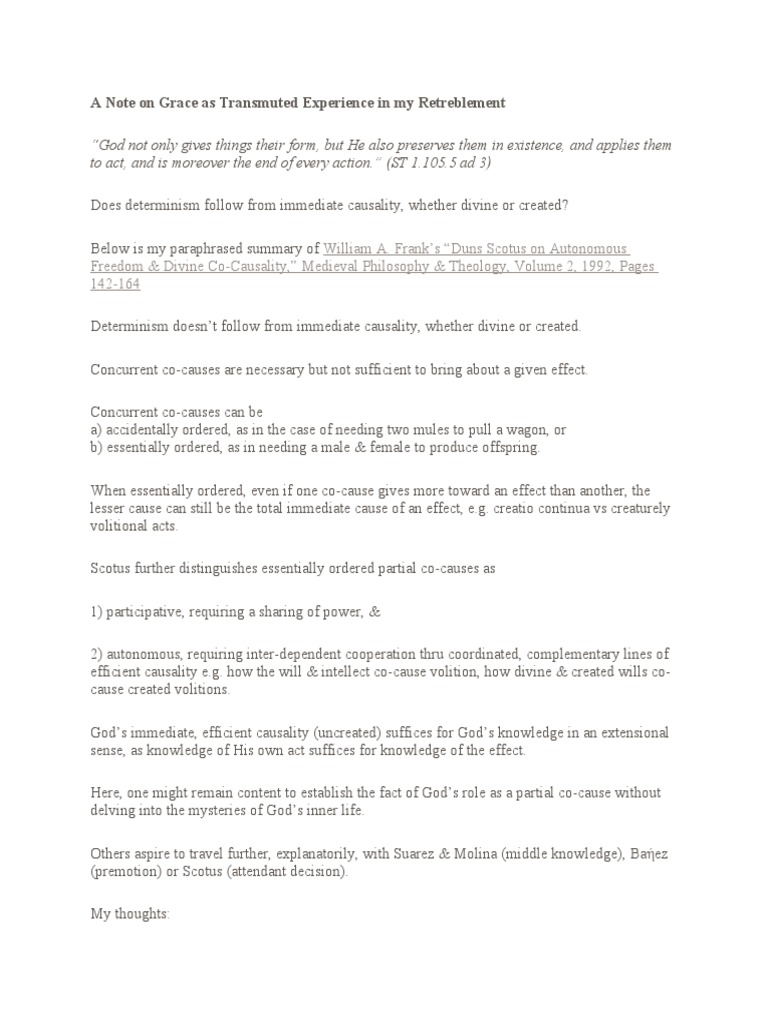The concept of theological determinism garners significant interest within philosophical and theological discourse. At its core, this doctrine posits that all events, including human actions, are predetermined by divine foreknowledge or divine decree. This presumes a universe orchestrated under divine governance, where every occurrence unfolds according to a celestial blueprint. A pertinent inquiry arises: if every decision is already inscribed in the annals of destiny, do we truly possess free will? This question can generate profound introspection and is emblematic of a considerable dilemma confronting both theists and philosophers alike.
As we delve deeper into the nuances of theological determinism, it becomes essential to explore its historical roots. Theological determinism asserts that God, as an omniscient entity, has foreknowledge of everything, including the choices individuals will make. This perspective has been influenced by various religious traditions, primarily within the monotheistic frameworks of Judaism, Christianity, and Islam. Early church fathers such as Augustine and later thinkers like John Calvin promoted such notions, positing that God’s omnipotence necessitates a deterministic universe, sequentially linking divine providence and human action.
Consider the ramifications of such beliefs. If God’s omniscience indeed encompasses every detail of existence, it could be argued that human agency is an illusion. For instance, if God knows that I will choose chocolate over vanilla ice cream, does that mean my choice is void of authenticity? The evocative interplay of divine foreknowledge and human decision-making invites a multitude of interpretations. On one hand, it could lead to fatalism; on the other, it ignites a battle for understanding between free will advocates and determinists.
Engaging with the philosophical implications of theological determinism necessitates understanding its relationship with fundamental concepts like morality and accountability. If our decisions are preordained, the question of moral culpability emerges. Can individuals be held accountable for actions that were, by some theological schema, predetermined? Classical determinists often argue that our responses to circumstances might be predetermined yet still meaningful within a moral context. This permits a nuanced discussion on human ethics and virtue within a framework that seems to undermine autonomy.
Another illuminating facet of this discourse is the tension between determinism and the apparent randomness of life. Events such as natural disasters, accidents, and even moral failings appear, on the surface, to contradict a neatly woven theological tapestry of predetermination. How can a world under divine control experience genuine chaos or suffering? Religious narratives frequently attempt to reconcile this discrepancy through concepts such as the ‘greater good’ or the idea that hardship may serve a divine purpose. In grappling with these challenges, it becomes clear that theological determinism is not merely an abstract doctrine; it influences real-world views about justice, mercy, and compassion.
Consider whether genuine love and trust can exist within a deterministic framework. If an individual’s affection is preordained, can it genuinely be termed love? This query opens a pathway to examine relational dynamics under the shadow of divine omniscience. The profound nature of interpersonal relationships often hinges on perceived choice. If beliefs arise from an inherent understanding of freedom, are we thus meant to view our connections as constructs of determinism or real expressions of free will? An exploration of these relationships could yield insights into our inherent need for autonomy within social constructs, challenging theological determinism’s permanence.
The exploration of contrasting philosophies, such as libertarian free will, further highlights the complexities surrounding this topic. Those who subscribe to libertarian free will argue that individuals possess the agency to influence outcomes without being subjected to predestined paths. This juxtaposition raises critical questions about the essence of human nature: Are we mere players in a divine script, or active participants in a spontaneous reality? The ramifications of either viewpoint reverberate through theological, ethical, and even existential domains.
Analysing theological determinism through the lens of modern scientific discoveries adds an additional layer of complexity. With advancements in neuroscience and psychology, the notion of free will is often scrutinized. Studies have suggested that unconscious processes can precede conscious decision-making, aligning with determinist thinking while simultaneously challenging the notion of autonomy. The synthesis of science and philosophy invites a reconsideration of age-old theological disputations. Can these realms coexist harmoniously, or does the advent of empirical understanding necessitate a reevaluation of divine determinacy?
The trajectory of theological determinism also prompts considerations of eschatology—the study of end times and ultimate destinies. Various faith traditions interpolate the concepts of predestination and divine decrees in discussions regarding judgment and afterlife. This interplay raises further questions: Is there purpose in predetermination, or does it merely lend itself to fatalism? As communities grapple with these ideas, can they shape understanding around individual purpose within a divinely orchestrated cosmos?
In summary, the inquiry into theological determinism transcends mere philosophical debate; it encapsulates fundamental human concerns regarding control, agency, and morality. The interplay of divine foreknowledge and free will invites us to wrestle with the mysteries of life, existence, and the potential of transcendence beyond deterministic paradigms. Thus, one must ponder: in striving for understanding within this complex narrative, do we forge a path toward authentic agency or become mere puppets fashioned by the hands of fate? The dialogue surrounding theological determinism remains dynamic, urging continual intellectual exploration and introspection.
